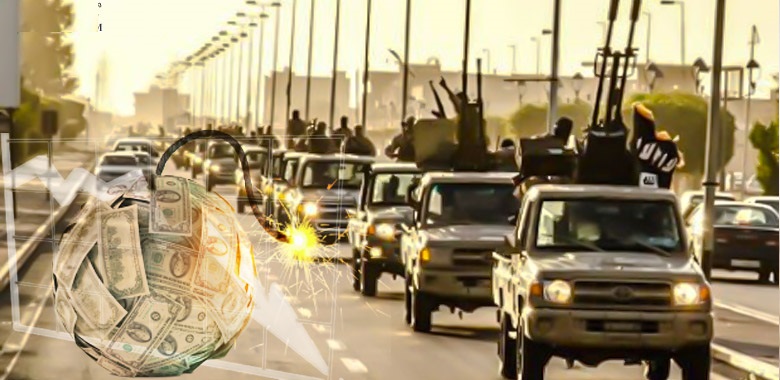AhlulBayt News Agency - Once ISIS has been famous for being world’s richest terrorist group, however, today the group is suffering from considerable financial problems. The airstrikes, financial downturn in Syria and Iraq and plummeting oil prices all helped deal the strongest financial blow to this terror organization.
The political scientist Patrick B, Johnston, in an analysis published by Rand institute has written that “the coalition’s successes in countering ISIS financing owe primarily to two main efforts:
The first is an air campaign against the group's oil revenue and the second effort has targeted ISIS’ cash directly, going after the banks where the group stores its cash in Iraq.” The airstrikes have destroyed much of money in ISIS’ Bayt al-Mal, or general treasury in English, where the terror organization keeps its cash.
The spokesman for the anti-ISIS coalition Colonel Steve Warren has said that two coalition’s air raids carried out in January on an ISIS-held Mosul bank have destroyed between “tens of millions” and “a billion” dollars of bulk “Daesh (Arabic name for ISIS terrorists group) cash.”
These airstrikes are an adjunct to the measures taken against ISIS’ oil revenues in Syria. The group holds in its control only a small part of Iraq’s oil reserves, and it relies on taxing and other financial sources in Iraq to finance its assaults in the country.
But the declining financial conditions in Syria and Iraq have hit ISIS’ power for making money. For example the Iraqi government has halted paying salaries to its employees in the areas where ISIS is in control.
The government’s employees were forced to pay the highest amount of taxes to the terror group. Furthermore, the falling oil prices have cut the profitability of ISIS’ oil operations. “The difficulty of producing and smuggling cheap oil across borders has led ISIS to sell most of its oil locally in Iraq and Syria at steeply discounted prices,” adds Johnston.
Therefore, ISIS is deprived of hundreds of millions of dollars of cash it scheduled to gain to finance its military operations in both Iraq and Syria. In practice, this means that now the terror group has to find ways to fund itself within its self-proclaimed caliphate.
“But despite all of these successes it is too early to dismiss ISIS financially, “continues Johnston. Where would ISIS head for money? It is simply the economy. Johnston maintains that” In the absence of Iraqi and Syrian security and opposition forces capable of reclaiming ISIS territory, the group continues to control important economic and financial resources in Iraq and Syria's agricultural, manufacturing and financial sectors.” The question is that whether ISIS has the potentials to use these economic sources to build a self-sufficient economy to fund its military operations.
“No other terrorist group has faced as much pressure to conduct effective large-scale economic governance,” adds Johnston. Unlike Al-Qaeda, ISIS has not reposed hope only on funding provided by the donors.
Some analysts say that lack of technical expertise and interventionist policies have eliminated ISIS’ ability to envision ways for sustainable economy. Today, the group’s declared policies show that its economic outlook perhaps is not as gloomy as what the economic analysts prefigure. For example, ISIS terrorist group is pursuing the policy of developing the technical expertise from the former government and that of the private sectors. “More broadly, ISIS economic policies are remarkably consistent with many of the market-friendly recommendations that international financial institutions typically make,” claims Johnston.
For example we can refer to a policy based on which ISIS terrorist group minimizes its ownership in industry sector. Additionally, the studies suggest that ISIS it careful to balance its spending with its revenues. Johnston says that “ISIS’ ability to withstand austerity measures means that the group may be able to survive — and thrive — as an insurgent and terrorist threat despite the current strain on its finance.”
In this phase of anti-ISIS campaign, to battle the terror group in an effective way, the strains on its oil operations and the cash storage locations must keep going on. At the same time, it is vital that new ways to break ISIS economic control cycles be found. The best way is the simplest way: To separate ISIS from the population from whom it profits. The recapture operations in Ramadi and Tikrit, which used to be under ISIS’ control, are good examples of such success.
/129
source : Al Waqt News
Monday
14 March 2016
12:38:32 PM
740955

The spokesman for the anti-ISIS coalition Colonel Steve Warren has said that two coalition’s air raids carried out in January on an ISIS-held Mosul bank have destroyed between “tens of millions” and “a billion” dollars of bulk “Daesh (Arabic name for ISIS terrorists group) cash.”
